I’ve been writing about the housing market for years now.
It fascinates me to no finish as a result of housing is without doubt one of the most essential selections from a private and monetary perspective.
Lately, a lot of my focus has been on how damaged the residential housing market is.
Increased costs and mortgage charges have pushed housing affordability to ranges we’ve by no means seen earlier than in america.
There are quite a few causes for the affordability disaster but when I needed to boil it down to 1 factor it’s this: we merely don’t construct sufficient housing items.
Housing is a nationwide dialog, however everybody is aware of actual property is native. Completely different states and municipalities have completely different guidelines and rules on the subject of constructing codes and such.
Sure cities have prioritized constructing, whereas others have made it exceedingly troublesome over time by including burdensome layers of pink tape.
This extends past single-family housing.
Cities must construct extra multi-family housing as nicely.
Fortunately, now we have proof that constructing extra housing makes it extra inexpensive.
Pew explains how Minneapolis made housing growth within the metropolis a precedence:
Beginning in 2009, town enacted a collection of coverage adjustments that decreased after which eradicated minimal parking necessities, allowed building of accent dwelling items, and lowered minimal lot dimension necessities in residential zones, all with the aim of encouraging the development of extra housing. These adjustments culminated in Minneapolis 2040, a complete plan that took impact in 2020 and codified town’s dedication to increasing its housing provide, particularly close to commerce and transit.
And it labored!1
Simply take a look at the distinction between Minneapolis and the remainder of the state:
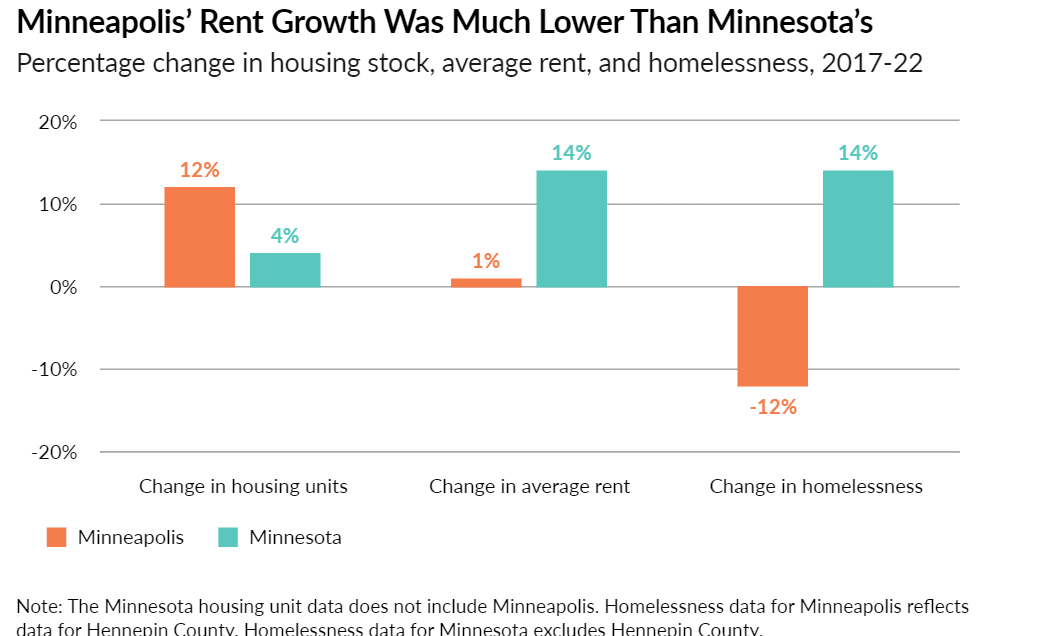
Extra housing, slower hire progress and decreased homelessness — win, win, win.
The Monetary Occasions checked out Minneapolis housing and hire progress versus a handful of midwestern cities:
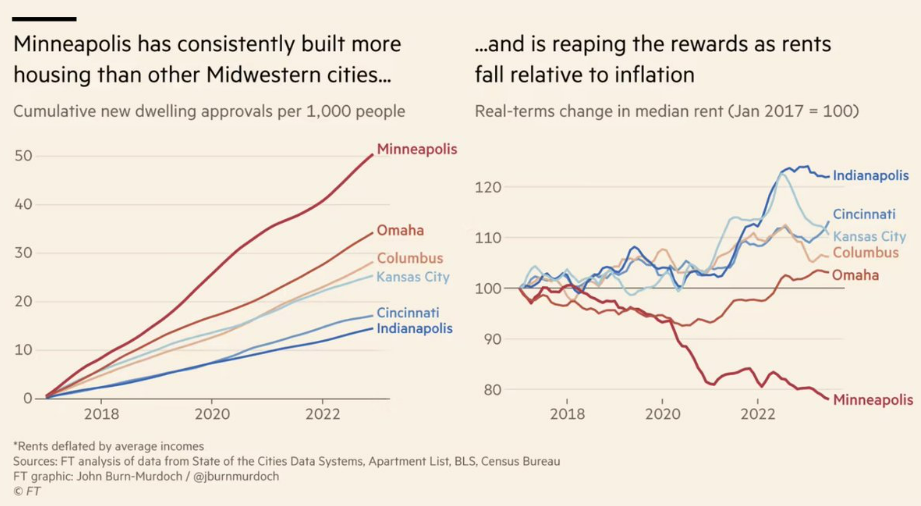
Shocker — constructing extra housing improves affordability:
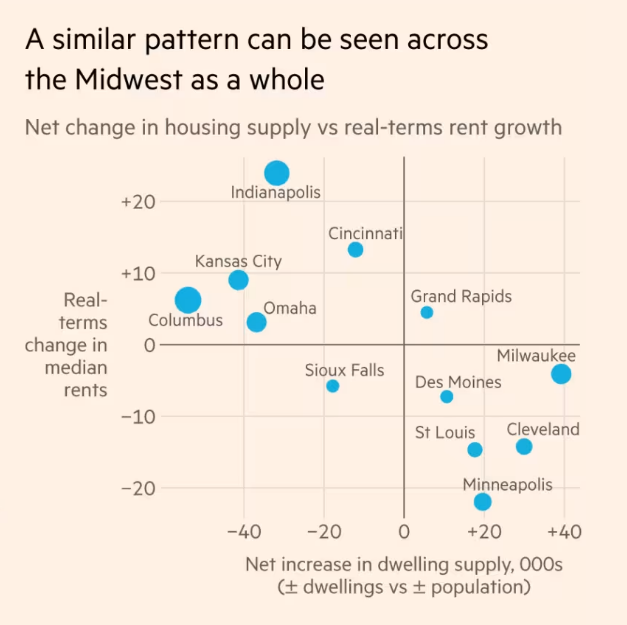
Texas provides one other instance of what occurs while you make constructing simpler.
The FT has a very good chart evaluating Texas and California on the subject of the connection between housing affordability and constructing permits:
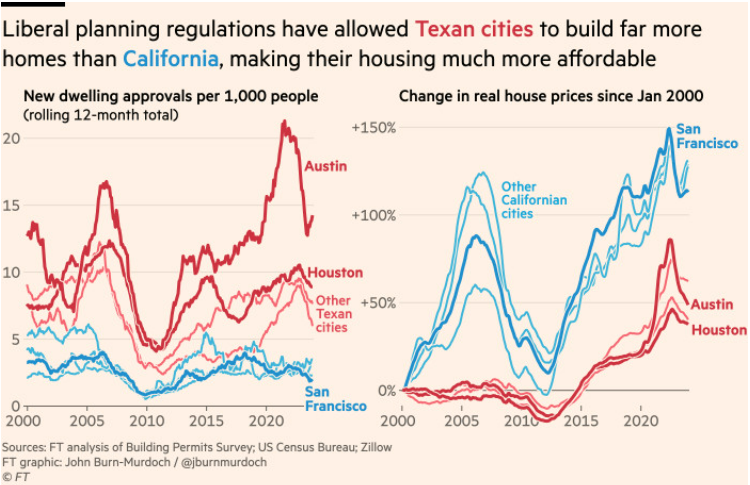
Right here’s some extra colour:
Within the 12 months ending March 2023, building started on 72,000 new houses in Houston, Texas, inhabitants 7.5mn: greater than thrice the 20,500 new houses began in London, whose inhabitants is significantly bigger.
You would need to pay $1.2mn {dollars} for the typical property on sale within the San Francisco/Oakland space immediately, round $800,000 for the everyday houses in London and New York, however simply $300,000 in Houston.
Austin is a primary instance of this concept.
Austin allowed essentially the most constructing permits per capita of any massive metro space in america from 2020 by 2023. Rents fell double digits in 2023 and are down almost 8% over the previous 12 months.
Condominium Record explains:
The Austin metro has seen the nation’s sharpest decline amongst massive metros, with costs there down 7.4 % within the final 12 months. The Austin metro can also be vital for allowing new houses on the quickest tempo of any massive metro within the nation, signaling the essential function new provide performs in managing long-term affordability. Austin will not be alone in exhibiting this pattern. Among the many ten metros with sharpest year-over-year hire declines, seven additionally rank within the high ten for the very best charges of multifamily allowing exercise from 2021 to 2023 (Austin, Nashville, Raleigh, Jacksonville, Orlando, Phoenix, and San Antonio). Notably all of those markets are situated within the Solar Belt.
So why don’t extra cities take up this initiative?
NIMBYs fear constructing extra housing will decrease the worth of their houses. Individuals don’t like condominium buildings of their neighborhoods due to worries about parking, overcrowding, and aesthetics.
I get it that householders wish to see property costs preserve going up. Nonetheless, there is a component of pulling up the ladder behind you the place individuals don’t wish to afford the identical alternatives they’d on the subject of buying property or dwelling in a fantastic neighborhood.
Sadly, greater charges are inflicting housing begins for each multi-family and single-family houses to roll over:
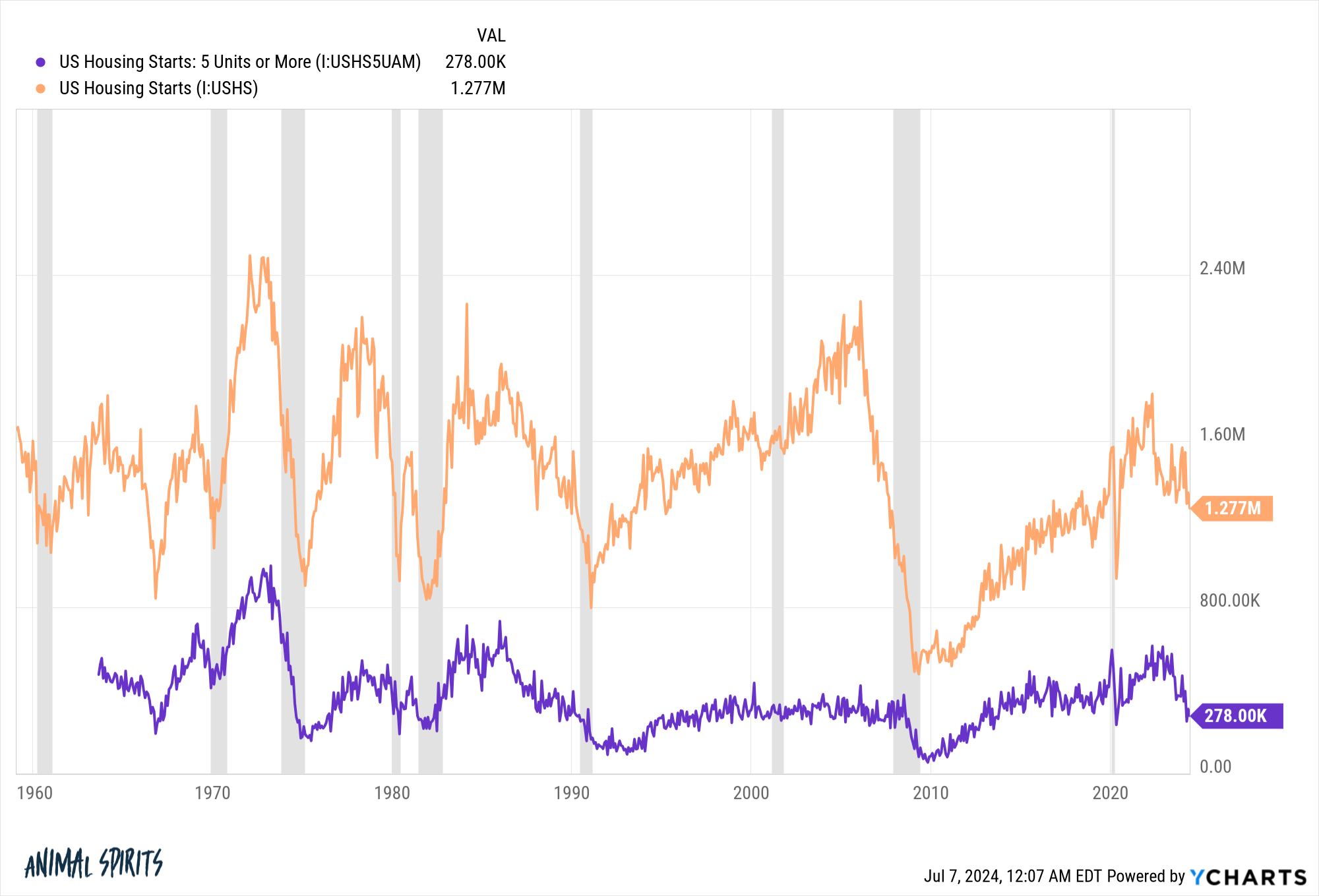
However mortgage charges alone aren’t going to incentivize homebuilders to extend provide. Municipalities must take away all of the pink tape concerned to make constructing simpler.
If not, the housing market will proceed to drive wealth inequality and make it more durable on youthful generations.
Michael and I spoke with Coby Lefkowitz on all of those dynamics, what he’s doing to construct extra inexpensive housing and far more:
Additional Studying:
We Have to Construct Extra Homes
1A single underground parking house can value upwards of $50,000.


